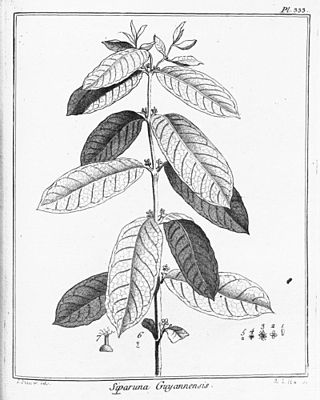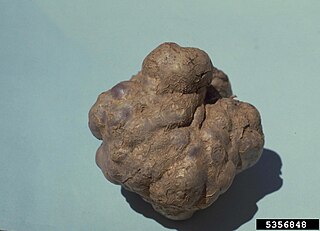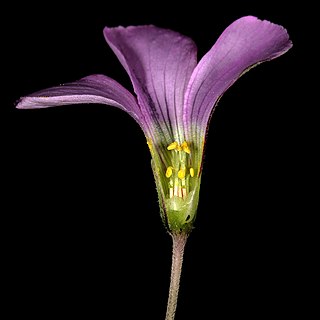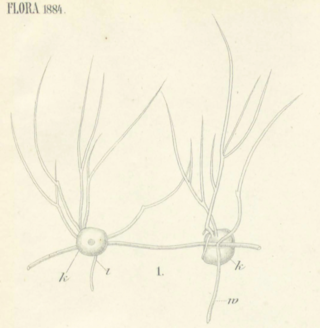
Hydrozoa is a taxonomic class of individually very small, predatory animals, some solitary and some colonial, most of which inhabit saline water. The colonies of the colonial species can be large, and in some cases the specialized individual animals cannot survive outside the colony. A few genera within this class live in freshwater habitats. Hydrozoans are related to jellyfish and corals, which also belong to the phylum Cnidaria.

Oidium is a genus of Deuteromycetes, where traditionally most anamorphs of the order Erysiphales are included. Most of them are plant pathogens causing different forms of powdery mildew, for example:

Siparuna is a genus of plants belonging to the family Siparunaceae. These aromatic evergreen trees and shrubs are found throughout the Neotropical realm. Over 70 species have been described.

Methylobacterium is a genus of Hyphomicrobiales.

Thecaphora solani, potato smut, is a fungal plant pathogen. It affects plants, primarily potatoes, in the Andean part of South America. The disease of potatoes that it causes is economically important.
Thecaphora is a genus of basidiomycote fungus which contains several species of plant pathogens. The widespread genus contained about 57 species in 2008. and held 61 species in 2020.

Urocystis is a genus of smut fungi containing plant pathogens, which infect grass species and other plants.

Julia is a genus of minute sea snails, marine gastropod mollusks or micromollusks in the superfamily Oxynooidea.
Julia mishimaensis is a species of a sea snail with a shell comprising two separate hinged pieces or valves. It is a marine gastropod mollusk in the family Juliidae.
Julia thecaphora is a species of a sea snail with a shell comprising two separate hinged pieces or valves. It is a marine gastropod mollusk in the family Juliidae.

Oxalis articulata, known as pink-sorrel, pink wood sorrel, windowbox wood-sorrel, chari amilo (Nepal), sourgrass, netho (khatta) saag (India) is a perennial plant species in the genus Oxalis native to temperate South America. It has been introduced in Europe in gardens and is now naturalized in these areas.

Puccinia oxalidis is a fungus species in the genus Puccinia. This species is a causal agent of rust on plants in the genus Oxalis, such as Oxalis articulata. The disease appears as yellow dots on the reverse of the leaves. The aecial stage can also be found on Berberis repens. It was originally found on Oxalis species in Mexico.

Oxalis debilis, the large-flowered pink-sorrel or pink woodsorrel, is a perennial plant and herb in the family Oxalidaceae. Its original distribution is South America but has become a very cosmopolitan species, occurring in all continents except Antarctica. It can be found in both temperate and tropical areas.
Franz Oberwinkler was a German mycologist, specialising in the fungal morphology, ecology and phylogeny of basidiomycetes.

Smaragdinella is a genus of medium-sized sea snails or bubble snails, marine opisthobranch gastropod molluscs in the family Haminoeidae, the haminoea bubble snails, part of the clade Cephalaspidea, the headshield slugs and bubble snails.

Oxalis bifida is a species of plant. The species was originally described by Carl Peter Thunberg in 1794

The Urocystidales are an order of fungi within the class Ustilaginomycetes. The order contains 6 families and about 400 genera. They are a sister order to Ustilaginales.

Tetramyxa is a cercozoan protist, member of the plasmodiophores, parasite of several flowering plants. It was first described by Karl von Goebel in 1884, in his work Flora. The genus is characterized by the appearance of resting spores in groups of four.
Thecaphora frezzii, commonly referred to as peanut smut, is a species of smut fungus of the genus Thecaphora and the family Glomosporiaceae. It is a basidiomycete fungus that infects peanut plants. It is currently only found in South America, more specifically in Argentinian peanut farms.












